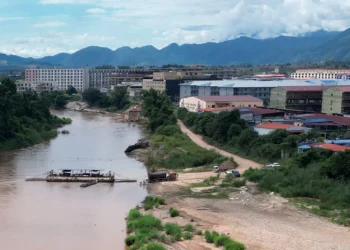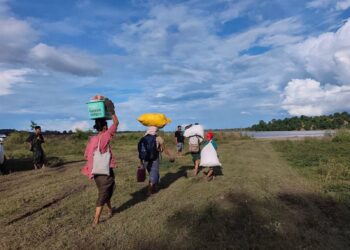Administrator U Lwin Thu* has some difficult decisions to make.
While he successfully managed to avoid conscripting any young men from his village tract during the first round, he’s now being forced by the Danubyu Township recruitment committee to name names for the second batch.
A father of two, Lwin Thu was appointed village tract administrator by the military regime shortly after it seized power in 2021, because the previous administrator who had worked under the civilian government resigned to protest the coup.
Before then, he was the lead campaign organiser in his village tract for the Union Solidarity and Development Party. The pro-military party ruled under President U Thein Sein from 2011-2016 but was humiliated in the 2015 and 2020 elections, failing to win a single seat across Ayeyarwady Region.
Overstretched by widespread armed opposition and taking losses on all fronts, the junta announced in February it would enforce a compulsory military service law enacted by the previous military regime. The 2010 law says any man aged 18-35 and woman aged 18-27 may be called to serve in the military for two years. This can be extended to five years during a national emergency, which the regime declared on the day of the coup.
The Danubyu Township recruitment committee – led by the commander of Light Infantry Battalion 108, the township administrator, and the township chief of police – summoned village tract administrators to a meeting in the first week of March.
“They told me to collect four trainees from each of the 12 villages in my village tract,” Lwin Thu explained.
While he didn’t dare complain at the meeting, afterwards he visited the senior officials separately, bringing “gifts” and complaining to them about the death threats he had received.
“One year ago, when an army officer came to our village to open a road, I was threatened in a Facebook post with a photo of a warning letter and bullets,” he said. “The letter said that they would use those bullets to shoot me if I work with military personnel again.”
Because it was posted by an anonymous account, he didn’t know who threatened him, but it still struck fear into his heart.
“I told them I don’t dare carry out conscription activities in my village tract. They were able to find enough trainees for the township from other administrators, so they didn’t force me,” he said. “But it was obvious from their faces that they didn’t like me.”
After the Myanmar New Year holiday of Thingyan, from April 13 to 16, Lwin Thu and other local administrators were again told they needed to collect more recruits. But this time, his appeal to the township administrator fell on deaf ears, and he was too afraid to visit the military or police officers.
One way out is to resign, but Lwin Thu claims he has a good relationship with his constituents and protects them as best he can. He worries that any potential replacement would be more oppressive.
“There are a couple of men, including a former administrator who served under the U Thein Sein government, who would want to take my position if I resign. But the residents are afraid these people would oppress them,” he said.
He acknowledged he also has business interests that would be threatened if he resigned, but insisted this hasn’t factored into his decision-making.
Now, with the support of wealthier residents, Lwin Thu is inviting young people to enlist voluntarily in exchange for payment, rather than through a random lottery draw. As reported by Frontier, administrators elsewhere in Myanmar have used similar enticements to find recruits, using money raised from the community.
“I already found one volunteer and welcome any others,” Lwin Thu said. “We are planning to provide around K5 million [nearly US$1,300 at the market rate] to each of them once they join the training.”
Administrators under threat
The regime has said it would conscript 50,000 men and women per year, from a pool of 14 million eligible people nationwide.
According to a report by the Burma Affairs & Conflict Study, the junta hit its target of recruiting 5,000 individuals in the first batch, dispatching those newly-enlisted youth to 15 military training schools across the country.
BACS researcher Ko Min Htet Aung told Frontier that the junta was able to conscript soldiers from 224 of Myanmar’s 330 townships, and that ward and village tract administrators played a crucial part in the recruitment process. Min Htet Aung said that, collectively, these administrators are “the most basic mechanism of the junta. Many of their other administrative processes are rooted in this mechanism.”
With the help of representatives of 100-household clusters, and the heads of 10-household clusters below them, they communicate government orders and keep records on residents, principally through lists containing the members of each household. “This mechanism is also the basis for learning about the young people in the community,” Min Htet Aung added. “From enumeration to summoning, administrators play a crucial role.”
These administrators are local appointees who report to township branches of the General Administration Department. One of the reforms introduced under the elected National League for Democracy government was to transfer the GAD from the home affairs ministry, controlled by the military, to the office of the union government, controlled by the civilian administration. Months after the military seized power, in May 2021, it undid this reform.
The junta also undid another reform. From 2012, the administrators of Myanmar’s 16,800 wards and village tracts were elected by their communities, but since the coup they have been directly appointed by Township Administration Councils formed by the regime.
The role these administrators play in upholding the regime’s unpopular policies has not gone unnoticed by resistance forces. They have been routinely assassinated since the coup, with a renewed surge in deaths since the conscription drive was announced. The BACS report said at least 30 administrators and aides were killed in the first two months, while Frontier’s own media monitoring indicates this number hit 40 by the end of April.
Ko Aseik Thee, spokesperson for the People’s Defence Organisation-Natmauk in Magway Region said village tract administrator U Khan Maung Aye was “given many warnings”, which he ignored.
“Therefore we had to kill him,” said Aseik Thee, whose group is under the command of the National Unity Government.
The routine killing of minor regime officials, including tax collectors and electricity technicians, has sparked some debate, but few feel sympathy for administrators working to replenish the military’s ranks through forced recruitment.
“Every chance we get, we will annihilate the administrators and Pyusawhti who are forcibly recruiting for the regime,” said Aseik Thee, referring to pro-military militias largely active in the Dry Zone. “They are a military target.”
This seems to be a reference to the NUG’s military code of conduct, which limits attacks to “military targets”, vaguely defined as anything that “contributes to the enemy’s military action by its nature”.
NUG spokesperson U Kyaw Zaw said the parallel government has “no policy on assassinations” and has neither told resistance groups to carry out these attacks nor forbid them from doing them. He said the killings are the inevitable result of public anger over oppression.
“People are being bullied more and more, so there may be outbursts of anger.”
Ko Nat Mauk, a spokesperson for the People’s Defence Force’s Taungoo District Battalion 3501, also under the NUG, said the conscription drive has had the reverse effect of pushing more youth to sign up for armed resistance forces.
“There are already hundreds of young people asking to join our group, and most of them are willing to become revolutionary soldiers, but there are limited resources to accept them,” he said.
The anti-junta uprising has never lacked manpower, but arming and financially supporting the many willing fighters has proven trickier.
“They [the administrators] need to stop working. If not, they must face the consequences for their actions,” Nat Mauk warned.
There have been reports of mass resignations by local regime administrators in recent months, presumably to avoid assassination, but in some cases residents claim the resignations were faked.
“Four administrators were killed in Salin Township, and then news spread that the other administrators resigned, but they are still working,” said a resident of Magyigone village in the Magway Region township. “They just wanted to escape being targeted by the PDFs.”
But Ko Myo Htet*, a 100-household leader in Yangon’s North Dagon Township, said quitting isn’t as easy as it sounds.
“Sometimes an administrator can’t quit his position even if he wants to,” he said. “Investigations would start and there would be many pressures on him and his family. He could even be arrested.”
Risk and reward
Although answering to the township-level GAD, ward and village tract administrators are not formally part of the civil service. Instead, they are considered volunteers and receive a monthly stipend of K70,000, with an extra K50,000 for office supplies and other expenses. Few would be willing to risk their lives for less than $60 per month, but the job comes with ample opportunities to supplement that income.
Before becoming an administrator, Lwin Thu ran a small betel nut shop, other residents say. But since then, he has opened a water purification plant and begun distributing his own brand of bottled water in the villages under his authority.
“It has no registration number from the FDA [Food and Drug Administration], but no one dares complain about it because he’s working under the authority of the township administrator and chief of police,” a resident explained to Frontier. “If someone else tried to do that, they’d be stopped.”
Administrators also have many opportunities for bribery and favouritism. The resident said occasionally islands appear in the river near their village, and are divided and cultivated as farmland.
“The distributions are led by the administrator, so he and his relatives get most of the acres of land,” she said.
It’s much the same story in urban areas. In the working class township of East Hlaing Tharyar in Yangon, the Shan Chaung ward administrator U Zaw Gyi has become infamous for extorting bribes and ruling over residents with an iron fist.
“If people in the ward make a real estate transaction, they have to pay him K500,000 to K1 million. If they pay him, he will sign as a witness. If they don’t, he and his followers will disturb the transaction,” said a resident, who alleged this ranges from refusing to cooperate with legal proceedings to threats and intimidation.
“Also, he and his team can make a lot of money from overnight guest registrations, because there are many migrants in our ward,” he said, adding, “they demand K2,000 for each registration,” which has to be renewed every two weeks.
After the coup, the military reintroduced draconian guest registration rules that had been abolished by the civilian government. If a non-resident isn’t properly registered at a property, both they and the host could be arrested during midnight inspections.
Due to the illicit money-making opportunities, many people are jockeying for administrator positions despite the risk of assassination, as is evident from a recent power struggle in Danubyu town’s 18th ward.
The administrator at the time of the coup resigned in protest and was replaced by a USDP supporter named U Soe Myint Aung. But there was another person scheming in the shadows – U Than Win Htay, who had served in the Cooperative Department under Thein Sein’s government.
Ward residents said that although Soe Myint Aung supported the USDP, his wife was a known supporter of the NLD, so Than Win Htay and his followers spread rumours that she was providing funds to armed resistance groups. In early 2022, she was arrested and Soe Myint Aung was dismissed and replaced by Than Win Htay, who residents say is a loyal servant to the regime and infamous for his corruption.
Resident Ko Saw*, who fled his home in March to avoid conscription, told Frontier that Than Win Htay is treating the recruitment drive as another cash cow, demanding payment from people drawn in the lottery to avoid service.
“One of the people picked in the lottery was freed from conscription the next day, [officially] because he failed to meet the medical requirement,” he claimed. “But in fact, he was let go because he paid the money he was asked for.”
In some places, though, even a pliant administrator hasn’t been enough to overcome unanimous public opposition. U Thar Aye*, resident of Yonechaung village in Danubyu Township, said the local administrator failed to conscript anybody for the first round because the villagers boycotted the process.
“When we were invited to participate in the lottery draw, we discovered that his son and nephew weren’t on the list,” said Thar Aye, whose own 25-year-old son is also eligible for the draft. “We all complained about it and boycotted the event, so the draw wasn’t held and the administrator couldn’t find any trainees for the first round.”
But that may have only bought them some time.
“He said he won’t get involved in this process anymore, but the township committee will summon people by name themselves.”
*indicates the use of a pseudonym for security reasons






